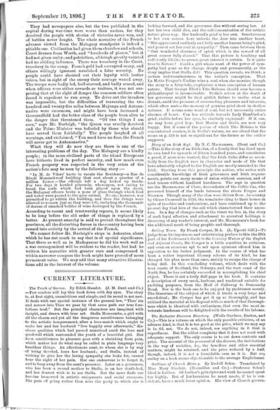CURRENT LITERATURE.
' The Touch of Sorrow. By Edith Hamlet. (J. M. Dent and Co.) —Few readers will lay this book down with dry eyes. The story is, at first sight, unambitious and simple, and its moral is not new. It deals with one special instance of the general law, " Thro' sin and sorrow into Thee we pass by that same path our true fore- fathers trod." But the principal characters are imagined with insight, and drawn with true art. Stella Morecombe, a girl with all the charm and yet all the dangerous sensitiveness belonging rite the artistic temperament, after a love-match which ought to make her and her husband "live happily ever afterwards," dis- closes qualities which had passed unnoticed amid the love and • good-will which surrounded the youth of a beautiful girL Her keen sensitiveness to pleasure goes with a shrinking from pain, which makes her do what may be called in plain language very heartless things. An affectionate aunt, to whom she is by way 'Of being devoted, loses her husband ; and Stella, instead of wishing to give her the loving sympathy she looks for, cannot bear the sight of her pain. Her one endeavour is to forget it, and to keep away from the aunt's presence. Later on a governess, who has been a second mother to Stella, is on her death-bed, and her dearest wish is to see Stella. But the news finds our heroine immersed in artistic enjoyments and social successes. She puts off going rather than miss the party to which she is
looking forward, and the governess dies without seeing her. At last her own child dies, and the self-concentration of the artistic nature gives way. Her husband's grief is her own. Sensitiveness to her own sorrow here unlocks the door into another heart. " She appreciated suddenly and fully another human being's grief, and poured out her soul in sympathy." Then came between them " that wonderful closeness of spirit which is the reward of all great sorrow fully shared." That this picture is touching and sufficiently lifelike to arouse great interest is certain. Is it quite true to Nature ? Could a girl whose want of the power of sym- pathy had gone so far change deeply and permanently, as the story implies that Stella did? This question reveals, we think, a certain indeterminateness in the writer's conception. That La Motto Fougue's Undine wins a soul when she marries, though the story is a fairy-tale, emphasises a true conception of human nature. That George Eliot's Tito Melema should ever become a philanthropist is inconceivable. Stella's action at the death of her governess might be that girlish failure to realise what is distant, amid the pressure of surrounding pleasures and interests, which often makes the memory of genuine grief short in shallow natures. It means some want of soul, but not necessarily entire absence of heart. Can her attitude towards Lady Hambledon's grief, visible before her eyes, be similarly explained? If it can, we may have good hope that Martin and Stella are now very happy. But if some of the poison of which Tito Melema is the concentrated essence, is in Stella's nature, we are afraid that the scene on p. 318 is not so significant for the future as the author supposes.


































 Previous page
Previous page